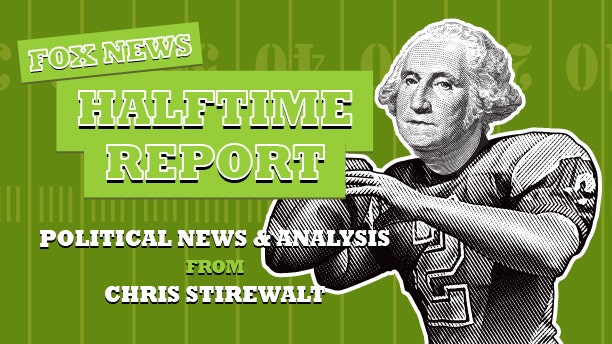Fox News Halftime Report -- Believe in America
Share from the web here . Want FOX News Halftime Report in your inbox every day? Sign up here . Sept. 11, 2020 ...

Sept. 11, 2020
By Chris Stirewalt
BELIEVE IN AMERICA
Every year on Sept. 11, Americans share a dual remembrance.
First we mourn the 2,997 Americans killed in the bloodiest day on American soil since the Civil War. We remember the feelings of helplessness and grief. Our hearts well up for the families of the victims. We marvel at the courage of those who ran into to the buildings or who called their loved ones to say a last goodbye. We still can't believe it was real.
The second mourning of this day, though, is for the loss of the unity we felt in that moment and the months that followed. Out of a cynical, divided nation emerged a new motto, "united we stand."
"If we learn nothing else from this tragedy," Sandy Dahl, wife of one of the pilots of Flight 93, said, "we learn that life is short and there is no time for hate."
But if we learned that at all, it didn't take until even the second anniversary of the attacks before new hatreds, even sharper than the ones before, had begun to emerge.
If you could describe the political and cultural conditions present at this years' anniversary to Americans in the immediate aftermath of the attacks, imagine the disappointment they would feel. But certainly by 2004, Americans would easily recognize the shape of things to come.
The breakdown of our political system revealed in the populist revolts and curdled partisanship of the 1990s had been paused, not reversed, by America's response to 9/11.
That's not to say that a people can every truly keep the lessons of a calamity indefinitely. You can remember the Alamo or the Maine or Pearl Harbor for a time, but when the war is over, life goes on. The blessing of mellowing of memories with time takes with it some of what we learned.
But this time, we didn't forget the right parts.
American politics and public life kept the intensity and apocalyptic tones of the early days after the attack and the start of what we once called the Global War on Terror.
But without the unifying purpose of defending the homeland, that powerful energy was turned inward and against each other.
After the successive shocks of a financial panic, deep recession and now a crippling pandemic, America sounds like a country that doesn't believe in itself anymore. With each successive challenge we seemed to find ourselves less able – less willing – to respond.
Historians will study the incapacity of such a great nation to deal with the coronavirus long after the last of us is gone. How does a country so rich, scientifically advanced and secure get bowled over by a pandemic and struggle for so long to get a handle on the problem? What went wrong?
One answer comes to us from a Pew Research survey of the residents of economically advanced nations. The U.S. had the lowest share of citizens who felt that the epidemic had made their county more united. Just 19 percent compared to an average score of 46 percent.
It's not that the virus made us more divided, but that our divisions made us less able to defeat the virus. Our failures were not ones of policy as much as they were of inability to cooperate.
We have not stood united. And even when we are being so acutely reminded of how short life is, we have still made time for hate.
The paranoid, dystopian rhetoric that crept in on the heels of 9/11 has stayed with us. We question each other's patriotism. We warn that the next election might be our last. We say that the other guy wasn't really American. We eagerly believe the worst about each other. We warn of shadowy forces destroying the nation just beyond our field of view.
That lack of confidence turned into a kind of political nihilism. If America's best days really were behind us, then why should we deny ourselves the satisfaction of our petty resentments and tribal antipathies? If this is the end, why not tear down the monuments to this failed endeavor? If the system is broken, why not take advantage of it for yourself?
How strange to see the freest, wealthiest and most powerful people in human history wrecking themselves in what amounts to a collective nervous breakdown.
But please remember, we have been here before.
Less than 50 years ago America was in worse shambles. After years of race riots, our country's first military defeat, egregious political corruption, economic malaise, energy crises and being held in contempt by third-rate powers around the world, it was easy to believe that after 200 years, we had shot our bolt.
But something changed in us. We became exhausted of defeatism and division. We grew tired of dwelling on what was wrong with America. It didn't happen all at once, but starting about the time of the bicentennial, America staged an audacious comeback that surprised the world and ourselves. The 20 or so years that followed were nothing short of earthshaking.
Ronald Reagan, one of the key figures in that turnaround once observed: "Freedom is never more than one generation away from extinction. We didn't pass it to our children in the bloodstream. It must be fought for, protected, and handed on for them to do the same."
He was echoing the sentiments of another indispensable American, Benjamin Franklin, who long ago told us: "Experience keeps a dear school, but fools will learn in no other."
The hard truth is that human beings are destined to learn again and again the facts of life as individuals and as a nation. As every parent knows, instruction can only carry someone so far before they have to learn from the consequences of their mistakes.
Well, the consequences have been piling up this century for America. And as much as we had hoped that the trauma of those attacks 19 years ago would have taught us those lessons so well that we could preserve the old verities about duty, honor and country, we have needed more instruction.
But when we do get to the place that we are ready to act like ourselves again, rest assured that the sacrifices, heroism and devotion of Sept. 11, 2001 will indeed be part of a new birth of our national confidence.
We will again believe in America.
AND NOW, A WORD FROM CHARLES…
"9/11 was our Pearl Harbor. This time, however, the enemy had no home address. No Tokyo. Which is why today's war could not be wrapped up in a mere four years. It was unconventional war by an unconventional enemy embedded within a worldwide religious community. Yet in a decade, we largely disarmed and defeated it, and developed the means to continue to pursue its remnants at rapidly decreasing cost. That is a historic achievement." – Charles Krauthammer (1950-2018) writing in the Washington Post on Sept. 8, 2011.


